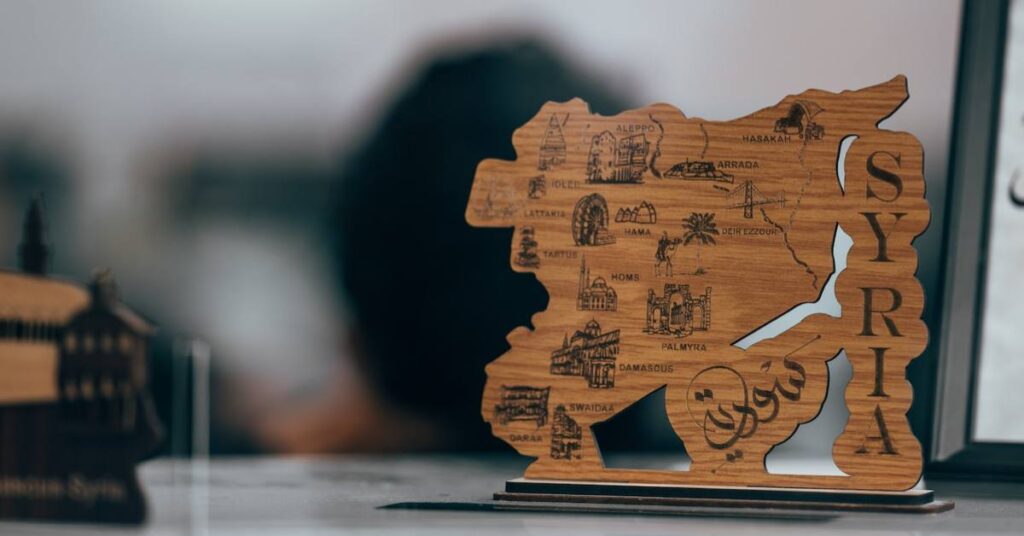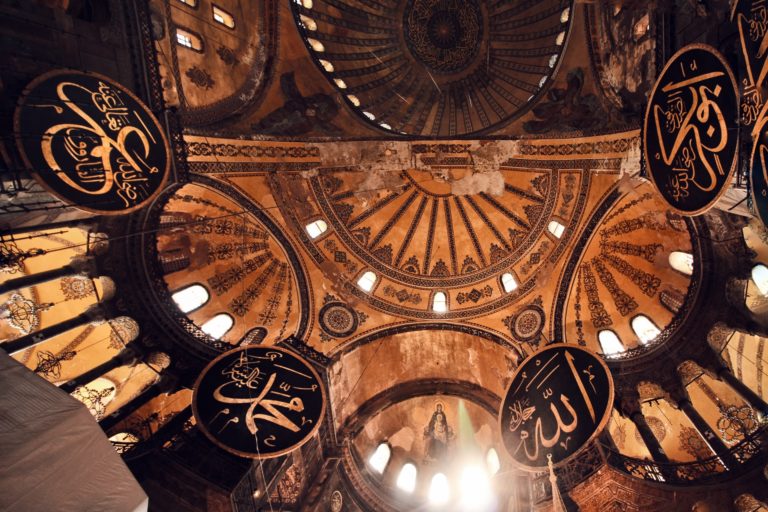Who is Shaykh Muhammad ʿAwwāmah?
He is Abū al-Faḍl, Muḥammad ibn Muḥammad ibn ʿAbd al-Qādir ibn ʿUmar ibn ʿAlī ʿAwwāmah al-Nuʿaymī al-Ḥusaynī al-Ḥanafī.
His mother was Sayyidah ʿĀ’ishah bint Aḥmad ibn ʿAlī, Āl Sirāj al-Dīn al-Ḥusayniyyah.
Hence, he is from a noble linage from both his parents’ side as his lineage eventually leads to Sayyidunā al-Ḥusayn ibn Fāṭimah al-Zahrā’ bint Muḥammad; the Messenger of Allāh ﷺ.
His birth:
Shaykh Muḥammad was born on Thursday 14th Dhū al-Ḥijjah 1358AH which corresponds with 25th January 1940AD in Aleppo, Syria in the district of Maqam Gate.
His upbringing and love for knowledge:
Shaykh Muḥammad ʿAwwāmah grew up in an environment which was scholarly in its views, submissive and righteous in its temperament, humble in its dealings and relationships and simple in its state of affairs. It was held with great esteem within society because of his father’s kindness, ethics, foresight, knowledge and piety.
Shaykh ʿAwwāmah’s father was a companion of scholars, and close friend of elders; both scholars and politicians. His gatherings were sought out, his reputation was acknowledged and his statements were circulated and deliberated.
Hence, Shaykh ʿAwwāmah lived in a cultivated, religious environment and so he dedicated himself to his father’s best friend; Shaykh Muḥammad al-Salqīnī رحمه الله who was the scholar and imām of the district. Shaykh ʿAwwāmah at the age of ten started going to his masjid; al-Tawashi Mosque to perform his five daily ṣalawāt and to attend his lessons and listen to his advices.
He حفظه الله was greatly influenced by Shaykh al-Salqīnī’s character, humility, asceticism, chastity and self-denial. The actions of Shaykh Salqīnī in front this developing child was a practical and spiritual upbringing. He was the first of Shaykh ʿAwwāmah’s teachers and his upbringing is still engraved in his mind such that he mentions it to his children and brings them up in the same manner.
His search for knowledge:
Shaykh ʿAwwāmah graduated from his primary school; ʿUmar ibn ʿAbd al-ʿAzīz in the year 1952 and thereafter enrolled in al-Madrasah al-Shaʿbāniyyah in the year 1953 through the advice of his teacher; Shaykh Muḥammad al-Salqīnī raḥimahullāh. There he studied sharʿī knowledge gradually which is why his knowledge is so solidified and firm.
Allāh ﷻ blessed and honoured Shaykh ʿAwwāmah حفظه الله such that he experienced an era in which Islamic knowledge was taught solely. His teachers at al-Madrasah al-Shaʿbāniyyah taught him lessons especially designed for him and his classmates. They were taught adab (good manners and etiquettes) before sharʿī knowledge and how to deal with the vessels of knowledge; teachers and books before actually studying them. Their Islamic education was not mixed with modern concepts and ideologies. Rather, they were taught in the pure and authentic manner upon which our pious predecessors treaded.
He remained in in al-Madrasah al-Shaʿbāniyyah until year five, after which he enrolled in al-Madrasah al-Khasruwiyyah since the state decided to abolish these small Islamic institutes, and join them all to al-Madrasah al-Khasruwiyyah; the first institute built in Aleppo.
But before doing so, he travelled to Egypt to study at al-Azhar with his classmates; Shaykh ʿAbd al-Majīd Qaṭṭān and Shaykh Ḥasan Qaṭṭān رحمهما الله. This was done through the permission of his teachers; Shaykh ʿAbdullāh Sirāj al-Dīn and Shaykh ʿAbd al-Fattāh Abū Ghuddah رحمهما الله. However, they were unable to enrol and so they returned to Aleppo two months later with their teachers’ permission.
He then graduated from al-Madrasah al-Khasruwiyyah in the year 1962. Shortly after, he enrolled in the University of Damascus to study secular knowledge and graduated in the year 1967. He took the good therein and infused it with his prior Islamic knowledge, thereby combining the soundness of his past and advancement of his present.
While studying there, he started teaching at the age of 22 at his teacher’s madrasah; Shaykh ʿAbdullāh Sirāj al-Dīn. This is where his academic studies ended. He didn’t pursue post-graduate studies since it wasn’t essential at that time. Rather, mere knowledge and ijāzah was recognised and accepted. Also, due to his dedication towards teaching and service to his teacher; Shaykh ʿAbdullāh Sirāj al-Dīn raḥimahullāh, he preferred to end his studies there.
His teachers:
Some of his teachers from al-Madrasah al-Shaʿbāniyyah were:
- Muḥammad Zayn al-ʿĀbidīn Jadhbah رحمه الله from whom he studied Ḥadīth and Tawḥīd.
- Muḥammad al-Ḥammād رحمه الله from whom he studied Ḥadīth.
- Ṭāhir Khayrullāh رحمه الله from whom he studied Tafsīr and Khiṭābah (Elocution).
- ʿAbdullāh Sirāj al-Dīn رحمه الله from whom he studied Muṣṭalaḥ al-Ḥadīth and Ḥanafī Fiqh.
- Muḥammad al-Muʿaddil رحمه الله from whom he studied Naḥw.
- Amīnullāh ʿAyrūḍ رحمه الله from whom he studied Manṭiq and Uṣūl al-Fiqh.
- Adīb Ḥasūn رحمه الله from whom he studied Akhlāq.
- Najīb Khiyāṭah رحمه الله from whom he studied Mīrāth and Tajwīd.
Some of his teachers from al-Madrasah al-Khasruwiyyah were:
- Abū al-Khayr Zayn al-ʿĀbidīn رحمه الله from whom he studied Tawḥid, ʿUlūm al-Qur’ān and Tafsīr.
- Muḥammad al-Salqīnī رحمه الله from whom he studied Ḥanafī Fiqh and Uṣūl al-Fiqh.
- Muḥammad al-Mallāḥ رحمه الله from whom he studied Balāghah and Tārīkh al-Tashrīʿ (History of Legislation).
- ʿAbdullāh Sirāj al-Dīn رحمه الله from whom he studied Ḥadīth, Muṣṭalaḥ al-Ḥadīth and Tafsīr.
Further Studies:
Shaykh ʿAbdullāh Sirāj al-Dīn, with consultation from his classmate and kindred spirit; Shaykh ʿAbd al-Fattāḥ Abū Ghuddah saw the need to select ten outstanding and intelligent students to study under senior scholars of various specialisations. This was necessary since al-Madrasah al-Shaʿbāniyyah was closed and the students were studying under the governmental Islamic secondary institute which was distant from the path of our predecessors.
They decided to teach them between Ṣalāh al-ʿAṣr and Maghrib in Jāmiʿ al-Ḥamawī; one of Aleppo’s oldest masājid so that their connection to the House of Allāh would remain.
The teachers who taught these fortunate ten students were:
- Shaykh Muḥammad Abū al-Khayr Zayn al-ʿĀbidīn who taught them Tafsīr al-Baghawī on Saturdays.
- Shaykh ʿAbdullāh Sirāj al-Dīn who taught them Fayḍ al-Qadīr on Sundays.
- Shaykh Muḥammad al-Salqīnī who taught them al-Ikhtiyār li Taʿlīl al-Mukhtār on Mondays.
- Shaykh ʿAbd al-Fattāḥ Abū Ghuddah who taught them Nasamāt al-Asḥār on Tuesdays.
- Shaykh Aḥmad al-Qallāsh who taught them Awḍaḥ al-Masālik on Wednesdays.
- Shaykh Muḥammad al-Salqīnī who taught them al-Ikhtiyār li Taʿlīl al-Mukhtār on Thursdays.
As for the students who were chosen, some of them were:
- Shaykh Muḥammad ʿAwwāmah
- Shaykh Zuhayr al-Nāṣir
- Shaykh ʿAbd al-Majīd Maʿāz
- Shaykh ʿAbd al-Sattār Abū Ghuddah
- Shaykh ʿAbd al-Ḥafīẓ Qalʿajī
- Shaykh ʿAbd al-Majīd Qaṭṭān
May Allāh be pleased with them all.
These lessons continued for an entire academic year and was the seed towards Shaykh ʿAbd al-Sirāj al-Dīn’s establishment of al-Madrasah al-Shaʿbāniyyah again.
Indeed, these concerted efforts; the strength of the teachers, brilliance of the students, the accuracy of selecting the books, executing the correct teaching method and choosing the perfect place to study was all done through the help and guidance of Allāh first and foremost.
His brilliance and its causes:
The causes and circumstances which Allāh ﷻ prepared for Shaykh ʿAwwāmah حفظه الله and blessed him with were from many directions and aspects. Briefly, they are:
Family circumstances: He حفظه الله was blessed with honourable parents who valued knowledge and scholars. They both knew and understood its position and rank and strived to nurture and educate their household upon Dīn.
Gradual acquisition of knowledge: This was previously discussed briefly.
His individual circumstances: Allāh ﷻ blessed him with qualities and environments which assisted his advancement and understanding of knowledge such as a brilliant, extraordinary memory, voracious reading, zeal and enthusiasm for studying, proper use of his time, his teachers’ attention towards him, his friends, a dedicated room for studying next to al-Madrasahal-Shaʿbāniyyah, the library of Shaykh Bāsum ʿAjam; one of Shaykh ʿAbd al-Fattāḥ Abū Ghuddah’s clasmates, his teachers’ encouragement, his love for this teachers and service towards them, especially Shaykh ʿAbdullāh Sirāj al-Dīn and Shaykh ʿAbd al-Fattāḥ Abū Ghuddah رحمهما الله.
Testimonies of scholars of his time regarding him:
Shaykh al-Ḥadīth Muḥammad Zakariyyā al-Kāndehlawī رحمه الله said: ‘Merit and excellence goes to our brother; Shaykh Muḥammad ʿAwwāmah in this era.’
Shaykh al-Muḥaddith al-Muḥaqqiq Ḥabīb al-Raḥman al-Aʿẓamī used to refer to Shaykh with the following titles: ‘Dear brother, intelligent scholar, gifted scholar and researcher, the beloved, shrewd, the best of the beloved, the possessor of great merit…’
Faqīh al-Udabā’ Shaykh ʿAlī al-Ṭanṭāwī رحمه الله said: ‘I have seen many scholars and have read many books, but I have not seen the likes of Shaykh Muḥammad ʿAwwāmah and have not read a book like his i.e, Athar al-Ḥadīth al-Sharīf.’
Faḍīlah al-ʿAllāmah Shaykh ʿAbd al-Fattāh Abū Ghuddah رحمه الله said: ‘He was my student yesterday but a close companion today.’
Faḍīlah al-ʿAllāmah Shaykh Sirāj al-Dīn رحمه الله said: ‘How I wish I had ten students like Shaykh Muḥammad ʿAwwāmah.’
Faḍīlah al-ʿAllāmah Shaykh Muḥammad Taqī Uthmānī حفظه الله said: ‘Shaykh Muḥammad ʿAwwāmah is among those who increased the riches of the Islamic libraries with his academic researches, valuable publications and excellent investigations and scrutiny. He is among those who made it easy for students of knowledge to thoroughly benefit from our invaluable academic legacy.’
His published works:
Among his publications:
- Athar al-Ḥadīth al-Sharīf fī Ikhtilāf al-A’immah al-Fuqahā’ raḍiyAllāhu ʿanhum
- Adab al-Iktilāf fī Masā’il al-ʿIlm wa al-Dīn
- Min Ṣiḥāḥ al-Ahādīth al-Qudsiyyah, Mi’ah Ḥadīth Qudsī maʿa Sharḥihā
- Al-Mukhtār min Farā’id al-Nuqūl wa al-Akhbār
- Ḥujjiyyah Afʿāl Rasūl Allāh ﷺ Uṣūliyyan wa Ḥadīthiyyan. Wa fīhi ʿiṣmatuhu min al-Khaṭa’ wa al-Khaṭī’ah
- Maʿālim Irshādiyyah li Ṣināʿah Ṭālib al-ʿIlm
Some of his numerous academic contributions:
- Musnad Amīr al-Mu’minīn ʿUmar ibn ʿAbd al-ʿAzīz raḍiyAllāh ʿanhu by Imām Bāghandī. Shaykh provided sources for the mentioned aḥādīth and their explanations.
- Taqrīb al-Tahdhīb by Ḥāfiẓ ibn Ḥajar. Shaykh compared the published book to its manuscript and corrected its misprints while also amending any oversights of the author رحمه الله.
- Al-Kāshif by Imām al-Dhahabī. Shaykh wrote an extensive introduction for it.
- Al-Ansāb by al-Samʿānī. Shaykh edited a portion of it; from the beginning of the letter ‘shīn’ to the end of ‘ʿayn’.
- Majālis fī Tafsīr Qawlihī Taʿālā: Laqad manna-Allāh ʿalā-l Mu’minīn by Ḥāfīẓ Ibn Nāṣir al-Dīn al-Dimashqī. Shaykh compared it to its manuscript and provided the sources and commentary for its texts.
- Al-Qawl al-Badīʿ fī al-Ṣalāh ʿalā al-Ḥabīb al-Shafīʿ by Imām Sakhāwī. Shaykh compared it to its manuscript and four other copies.
- Sunan Abū Dāwūd by Imām Abū Dāwūd al-Sijistānī. Shaykh edited it and compared it with the manuscript of Ḥāfiẓ Ibn Ḥajar رحمه الله and seven other copies.
- Al-Muṣannaf by Imam Ibn Abū Shaybah. Shaykh edited it and compared it with various manuscripts and provided references for its aḥādīth.
- A comparative Ḥadīth study of Naṣb al-Rāyah with two of its manuscripts. He was able to identify over 1000 printing errors.
May Allāh ﷻ extend his life and grant him his wants and aspirations in this world and the next. May He grant him ʿāfiyah (well-being), accept his incredible efforts and allow him to continue on this path of service to His Dīn till his last breath. Āmīn.
[Adapted from Ṣafaḥāt Muḍī’ah min Ḥayāh Sayyidī al-Wālid al-ʿAllāmah Muḥammad ʿAwwāmah]




